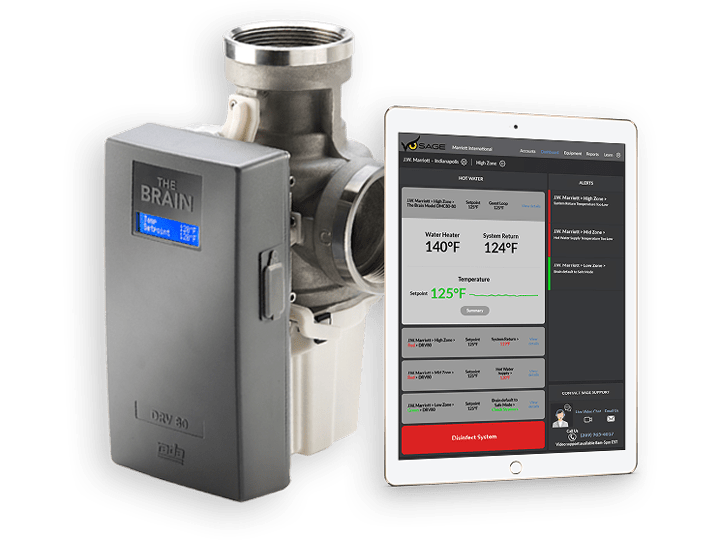Armstrong International offers leading-edge equipment, technology and software for best-in-class user safety, infection control and compliance, from mechanical room to point of use.
As the global leader in domestic hot water generation and digital mixing and water temperature control, Armstrong understands the Standards of Care and guidelines for your industry. Our state-of-the-art hot water solutions are designed to mitigate risks for the growth and spread of Legionella and other opportunistic pathogens in building water systems, while minimizing the risk of scald injury and associated litigation.

We provide hardware to guide your compliance, and software that allows you to prove it with accurate monitoring and documentation.
Armstrong introduced digital water temperature control to the world with The Brain®, and we brought you SAGE®, the most advanced monitoring and documentation software available. We can help you comply with regulations and Standards of Care from sources such as: ASHRAE; World Health Organization; National Academies of Sciences, Engineering and Medicine; and more.
- The Brain® and SAGE®—the first barriers to Legionella and essential to the prevention of Legionnaires’ disease.
- The Brain® Digital Recirculating Valve, Digital-Flo® Water Heaters, and SAGE® Smart Hot Water System Monitoring and Reporting are integral components of your institutional hot water system risk management plan.
“Legionnaires’ Disease – The Disease of Modern Plumbing Systems and Costly Litigation”
by Tim Keane, Legionella Risk Management, Inc.
Armstrong’s Multi-zone Hot Water System—Built for the Information Age
We’ve combined our state-of-the-art technology with system design for a simpler, smaller, multi-zone digital plumbing system that dramatically improves compliance with today’s standards of care. Armstrong’s multi-zone hot water system includes The Brain® digital water temperature control, SAGE® monitoring and documentation software, and Digital-Flo® water heaters.
Standards of Care to Reduce Risks of Legionella and Scalding
A Standard of Care is defined as acknowledged applicable laws, standards and guidelines. Following the appropriate Standard of Care can minimize the risk of Legionella-related illness and scalding injuries.
ASHRAE Guideline 12-2000 and ASHRAE Standard 188-2015 are Standards of Care which include critical recommendations for establishing and monitoring hot water system temperature control limits.

Legionella and Legionnaires’ Disease
Legionella is a type of bacteria that can cause a severe, often lethal form of pneumonia known as Legionnaires’ disease in persons at risk. Within the last decade, Legionnaires’ disease has been reported throughout the world. Outbreaks have been linked to buildings with large or complex water systems that are improperly maintained. The potable water systems of hotels, hospitals, nursing homes, and other facilities are major sources of Legionella, and it is most often found in hot water tanks and heaters, large plumbing systems, faucets and showers, hot tubs, whirlpool spas, decorative fountains and water features, and cooling towers (air conditioning units).
ASHRAE Guideline 12-2000
4.1.6 Recommended Treatment. Hot water stored above 60°C (140°F), minimum recirculated return 51°C (124°F).
ASHRAE Standard 188-2015 Legionellosis: Risk Management for Building Water Systems
6.1.3 Control Limits. Establish limits within which a chemical or physical parameter must be monitored and maintained.
ASHRAE Standard 188-2015 Legionellosis: Risk Management for Building Water Systems
6.1.4 Monitoring. Establish a system for monitoring the parameters associated with the control limits established in 6.1.3.
ASHRAE Standard 188-2015 Legionellosis: Risk Management for Building Water Systems
6.1.7 Documentation and Recordkeeping. Establish documentation and maintain records.

